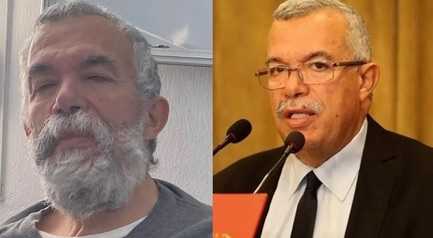
08 March 2022; MEMO: The Tunisian Ministry of Interior yesterday released the deputy head of the Ennahda party, Noureddine Bhiri, after detaining him for more than two months. He has been transferred to a hospital in the north of the country, after his health deteriorated.
Bhiri's defence team published a video documenting the moment of his release. It showed him being congratulated on his release in an ambulance.
His wife, lawyer Saeeda Al-Akrimi, said, "Bhiri was freed after 67 days," adding that he was "held hostage by [Preisdent] Kais Saied."
Former Interior Ministry official, Fathi El-Baldi, was also released, the Centre for Victims of Torture announced, he had been linked to Bhiri, according to a previous statement by the Ministry of Interior.
In a statement, the ministry said: "In accordance with the establishment of the interim Supreme Judiciary Council on March 7, it was decided on this same date to terminate the effect of the two house arrest rulings against the two concerned persons, so that the judiciary can complete the necessary research and procedures in their regard."
The Ennahda movement announced the "abduction" of Bhiri on 31 December by security men in civilian clothes, saying he had been taken to an unknown destination. He later launched a hunger strike in protest of his detention.
On 2 January, he was transferred to the resuscitation department in a hospital in Bizerte, after his health deteriorated because of the hunger strike.
The following day, the interior minister announced that Bhiri and El-Baldi had been placed under house arrest on charges related to "suspected terrorism" related to the illegally issuing of travel documents and citizenship to a Syrian and his wife. Claims they deny.
Tunisian President Kais Saied has held nearly total power since 25 July when he sacked the prime minister, suspended parliament and assumed executive authority citing a national emergency.
He appointed a prime minister on 29 September and a government has since been formed. In December, Saied announced that a referendum will be held on 25 July to consider 'constitutional reforms' and elections would follow in December 2022.
The majority of the country's political parties slammed the move as a "coup against the constitution" and the achievements of the 2011 revolution. Critics say Saied's decisions have strengthened the powers of the presidency at the expense of parliament and the government, and that he aims to transform the country's government into a presidential system.
On more than one occasion, Saied, who began a five-year presidential term in 2019, said that his exceptional decisions are not a coup, but rather measures within the framework of the constitution to protect the state from "imminent danger".




